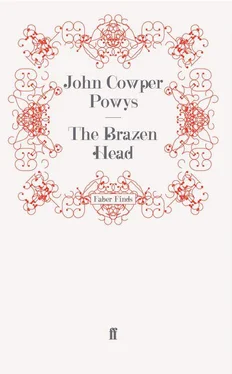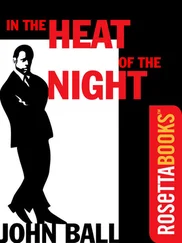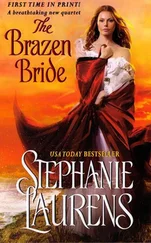Our traveller clutched with his left hand the body of “Little Pretty” under his clothes, and placing his right hand against the hilt of his eternally sheathed sword, he proceeded to balance his bottom upon this convenient knot of hammered metal-work and got strength and relief by so doing.
Indeed for a moment or two, as he listened to Bonaventura repeating his question with the judicial unction of an official executioner at the oriental court of Karakorum, he experienced a delicious thrill of complete irresponsibility, as if he had been an anonymous figure seated on a marble stool impervious to the goings on of mortals.
“My name, your Eminence, is Pierre de Maricourt, and I come from Picardy. My profession, as you see, is that of a soldier of the King of France. But I am also a student of the ancient tongues and I spend my wages in buying books. I know a little Greek and Latin, your Eminence, already; and I hope, before I die, to be able to learn a little Hebrew. I came over to have an opportunity of acquiring at close quarters a few details about the kind of mistakes — in orthodox divinity I mean — which Friar Bacon has been making.”
Petrus spoke slowly from more than one motive, and from more than one motive too he kept his terrific black eyes fixed as magnetically as he could upon Bonaventura’s face. Beneath his clothes, as you may believe, he kept the head of Little Pretty — for he knew by touch her head from her tail — aimed straight at his interlocutor and it soon became clear that Little Pretty’s effect, aided by the intensity of his own magnetic gaze was overmastering.
Bonaventura began showing signs of extreme agitation. He kept turning round and glancing anxiously at the brown-and-red jerkins and breeches of the group he had just left, as if he were afraid that the presence of their young mistress among them might dispel and destroy his own authority over them, and even result in some form of action entirely different from the line he wished them to take.
In his own secret consciousness Bonaventura was more upset than he had been for years. “I must,” he told himself, “adopt some powerful course of action with this accurst runaway from Picardy, who evidently is a lecherous pick-up of Lilith’s. I must frighten him in some sort of way.”
Meanwhile Petrus had commenced in dead silence conveying his wishes to “Little Pretty”.
“We must will him to lift up first one of his legs and then the other,” he told her, articulating his intention very definitely and moving her head, still pressed against his skin, so that it should point straight at Bonaventura’s skull. “First one and then the other, my treasure!” he repeated.
And behold! it actually happened; yes! it happened just exactly as our scientific student of magnetism had indicated to his precious magnet. Up went one leg of the General of the Grey Friars, while he made a shuffling movement with the foot still on the ground.
“Now make him lift the other, my sweet!” And down came Bonaventura’s left leg and up went his right. “Make the old sod dance a proper jig now, pretty one. We’ll learn him to be a Legate!”
And to the absolute amazement of a couple of Lost Towers men who had turned to look back while the rest of the crew were following Lilith into the Forest, and to the even greater astonishment of Friar Roger’s cousin from London, the enterprising Perspicax, who having been invited the night before to take his breakfast with Tilton and young John and possibly even with their parents too, if the Baron got back in time from his morning jaunt, now stood at Peter Peregrinus’ elbow.
“Is that a new kind of penance?” enquired the commander of the King’s Men.
“Do you know, Capitaine, I really do believe that it is!” replied Maître Pierre de Maricourt. “And the odd thing is,” he continued, twisting “Little Pretty” around against his own body so that her head pointed straight at the centre of the intruder’s not very high forehead, “the odd thing is that this particular penance is infectious! I even feel like joining it myself!” And he shuffled a little with the toes and heels of his sandals in the long grass.
To the commander of the King’s Men this untimely dance was indeed infectious. He raised his well-armoured knees in this grotesque jig even higher than the stately personage before them was lifting his grey robe; and he even went so far, for he had a daring and reckless spirit under his military restraint, as to stretch out his right hand and seize, much to this latter’s discomfiture, Bonaventura’s left hand.
This crazy dance, which might well have been, so Petrus grimly assured himself as he watched them, a dance in honour of an East-Indian idol, performed at Karakorum before the Khan, went on without a pause till the last of the red-brown bandits, together with their “leukolenian” or white-armed princess, had disappeared, and until a little group of highly amused but somewhat puzzled King’s Men had come up from the camp and arranged themselves in a line, evidently waiting for the morning’s proper business to begin.
It was from sheer exhaustion that both these dancers, Bonaventura in his noble grey garments and Perspicax in his by no means ignoble royal colours, finally and simultaneously sank, side by side, upon the moss and small ferns and wood-grass and ground-lichen beneath a half-circle of the massive trunks of five majestic pines. Mingled with an infernal satisfaction which distorted his face and made his tongue cleave to the roof of his mouth — and of course all chroniclers of Peter Peregrinus who neglect the physical motions of his tongue are dodging something essential — was a totally unexpected pity for the prostrate Perspicax.
What brought this pity into the erratic heart of our traveller was the simple pride which his humiliated victim had taken in being a soldier. This pride brought back to him his own childhood, and suggested to his mind the behaviour of the stately officials of the castle at Maricourt, and he couldn’t help muttering aloud a familiar tag of Homeric Greek that he had learnt as a boy in a monastic school: “Ephane mega seema!” “There appeared a great sign!”
And indeed as he watched the King’s Men lift up their commander and carry him off to their camp, and as he himself was assisting Bonaventura to his feet, there appeared, coming from between those enormous pine-trees, whose branchless trunks enhanced the romance of every event that occurred beneath them, no less a couple of celebrities than Albertus Magnus of Cologne and Friar Roger Bacon!
It was clear in a second to the wielder of “Little Pretty” that the great Dominican, who looked indeed a rampart of strength in his singular head-dress and peat-black raiment, had compelled the Prior of Bumset to liberate his captive, at least for a time.
“Whither were they bent now?” he thought. “Who could say? They must have started at dawn from the Priory! The Cologne man must have stayed the night there; perhaps in the very chamber of Roger Bacon, with whom he may have been arguing and discussing all night. There’s simply no limit,” thus Peter Peregrinus’ thoughts ran on, “to these learned idiots’ powers of disputation.”
Curiously enough in the agitating look-skirmish and gesture-drama that ensued between these four men — with “Little Pretty”, the deadly lodestone, pressed against the skin of Master Peter — the one who conducted himself with the greatest ease and the most successful assurance was Bonaventura.
Master Peter, as you can well imagine, didn’t miss this fact; his agile mind kept turning it over and over, and even as he hurried to be the first to speak, he decided that this superiority in social self-possession came from the fact of Bonaventura’s much wider experience of the contemporary world and more intimate knowledge of the royal courts of Europe than Friar Bacon could possibly have — or Albertus either, in spite of his two years as a Bishop.
Читать дальше











